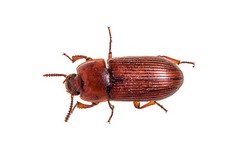Insect resilience in global warming
Climate change has been affecting many living organisms. The effects are triggered not only by global warming but also by increasing frequencies of rare events and variance of environmental conditions. The EU-funded CLIMINSECTS (The effect of expected climate change on insect performance: Physiology, behavior and life history) initiative set out to uncover how climate change and unfavourable climate in general affect ectotherms. The researchers looked at factors like organism body size, effects on fitness and performance, and behaviour. CLIMINSECTS investigated if insects have shrunk due to global warming, and the effects of starvation and old age on their ability to survive unfavourable temperatures. The researchers also investigated what effects rising temperatures may have on the longevity of an organism. The team studied the red flour beetle, which has a short generation time and is easily kept in the lab. CLIMINSECTS investigated how insects respond to climate under conflicting demands and set out to predict how these insects would respond to ongoing climate change. While expecting rising temperatures to lead to smaller body size, the researchers found no change in a sample of 4 000 specimens across 29 beetle species. Starvation and aging caused the beetles to be less resilient to thermal stress, the researchers found. The researchers found that higher temperatures are not necessarily harmful, and led to stronger heat and cold tolerance, which goes against the beneficial acclimation hypothesis of adapting to gradual change. CLIMINSECTS showed that reptiles in colder regions live longer, probably because they grow slowly compared to those in warmer areas. The researchers found that repeated or chronic stress has a different effect on insect performance than a single mild stress event. Taking the study further, the team found that the wormlion, a sand-dwelling insect, prefers shade that assures lower temperatures and mitigates risk of completely drying up. The researchers discovered that in such situations, insects can weigh the many factors present and reach an optimal decision.







